 |
| John Walker |
John Anthony Walker was born in 1937 and joined the Navy in ‘55 and served on destroyers and aircraft carriers before being assigned to submarines and receiving top secret cryptographic clearance after passing his Personal Reliability Program which is supposed to insure that only qualified and reliable people had access to nuclear weapons. He made his way through a quite successful military career, rasing to the rank of warrant officer and had run radio shops on several nuclear submarines. However, his personal life began to drag him down: he was in need of money after some bad investments and was not on best terms with his wife and children. His criticism of America’s unwillingness to end the Cold War led him to realize that the Soviet Union was not the aggressive adversary that the U.S. painted it to be, justifying his decision to start a second career as a spy for the Soviet Union.
/arc-anglerfish-arc2-prod-tronc.s3.amazonaws.com/public/OCTZNAUBOBALVIZDSG5WPUHNVU.jpg)
John Walker photocopied documents from his Navy base in Norfolk, and walked into the Soviet Embassy in Washington D.C. demanding to see the security personnel. Upon review, it turned out that the document contained information on vessels that had plagued the Soviet Fleet, and a National Security Agency document that he also photocopied had American encryption codes for the next month, which proved to be genuine. Walker was payed a few thousand dollars on the spot and enlisted as a Soviet spy. He would make drops twice per year, placing important photocopied information from the Navy in an old soda can in a park.
Over the next several years, Walker would continue to release important encrypted codes and information regarding American submarine activity and other important military war plans. He soon enlisted his friend Jerry Witworth to collect more information from other vessels, as well as his son Michael Lance and brother Arthur L. Walker. Over the next 18 years, this little family spy ring, who were all enlisted the Navy, proved to create the most important leak of information from the Navy in the Cold War such as cryptographic codes, material on weapon systems, nuclear weapons control, command procedures, hostile identification and stealth methods, and contingency target lists
Although there was mild suspicion that there was a deft spy somewhere in the Navy, no suspicion whatsoever fell on John Walker, until his luck ran out and his ex-wife notified the Navy that he was a spy. The pieces quickly fell in place, and upon questioning, his entire spy ring was found out. All were sentenced to prison, with John Walker serving a life sentence and dying from unknown causes on August 28th, 2014 while still in prison.
The cryptographic material that Walker leaked were considered the worst loss of documents that year, although not the most numerous. Soviet spy chief Boris Solomatin said the following about Walker’s intel: Walker’s information not only provided us with ongoing intelligence, but helped us over time to understand and study how [the American] military actually thinks”(John Walker Spy). Solomatin stated that the information provided by Walker gave immense insight into American nuclear submarine missile forces, and helped the superpowers evade war through enabling Moscow to appreciate America’s true intentions.
https://www.britannica.com/biography/John-Walker-American-spy
https://news.usni.org/2014/09/02/john-walker-spy-ring-u-s-navys-biggest-betrayal
It is interesting how the acts of a spy actually helped reduce tensions between the Soviet Union and the US. Yet, Walker's actions in giving the Soviet Union US intelligence documents could have potentially given the Soviets the upper hand if the Cold War ever escalated. Walkers career as a spy lasted an astounding 18 years, and it is interesting how the government could only find him after his ex-wife ratted him out. Who knows how much more damage he could have caused if he was never found and placed in prison for life.
ReplyDeletehttps://www.independent.co.uk/news/obituaries/john-walker-american-naval-officer-who-formed-a-family-spy-ring-that-passed-highly-damaging-secrets-9704890.html
This is a really interesting topic, especially the fact that Walker got away with espionage for nearly two decades. Upon doing further research, I learned that Walker's decision to become a spy was predominantly fueled by political disaffection that towards America's actions in the Cold War. He even believed that President John F. Kennedy's assassination was a government-led operation intended to prevent him from dampening the Cold War conflict.
ReplyDeletehttps://news.usni.org/2014/09/02/john-walker-spy-ring-u-s-navys-biggest-betrayal